|
|
|
Sort Order |
|
|
|
Items / Page
|
|
|
|
|
|
|
| Srl | Item |
| 1 |
ID:
049795
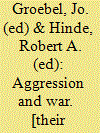

|
|
|
|
|
| Publication |
Cambridge, Cambridge University Press, 1989.
|
| Description |
xvi, 237p.
|
| Standard Number |
0521353564
|
|
|
|
|
|
|
|
|
|
|
|
Copies: C:1/I:0,R:0,Q:0
Circulation
| Accession# | Call# | Current Location | Status | Policy | Location |
| 031547 | 302.54/GRO 031547 | Main | On Shelf | General | |
|
|
|
|
| 2 |
ID:
140918
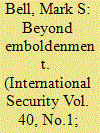

|
|
|
|
|
| Summary/Abstract |
What happens to the foreign policies of states when they acquire nuclear weapons? Despite its importance, this question has not been answered satisfactorily. Nuclear weapons can facilitate six conceptually distinct foreign policy behaviors: aggression, expansion, independence, bolstering, steadfastness, and compromise. This typology of foreign policy behaviors enables scholars to move beyond simple claims of “nuclear emboldenment,” and allows for more nuanced examination of the ways in which nuclear weapons affect the foreign policies of current and future nuclear states. The typology also sheds light on Great Britain's response to nuclear acquisition. Britain used nuclear weapons to engage in greater levels of steadfastness in responding to challenges, bolstering junior allies, and demonstrating independence from the United States, but it did not engage in greater levels of aggression, expansion, or compromise. The typology and the British case demonstrate the value of distinguishing among different effects of nuclear weapons acquisition, have implications for scholars' and policymakers' understanding of the role of nuclear weapons in international politics, and suggest avenues for future research.
|
|
|
|
|
|
|
|
|
|
|
|
|
|
|
|
| 3 |
ID:
193262
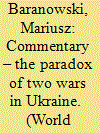

|
|
|
|
|
| Summary/Abstract |
The central thesis of this commentary focuses on the paradox of two wars occurring in parallel with Russian aggression in Ukraine. It is not just that—in addition to military action—there is a geopolitical tsunami and its consequences in the form of a possible food crisis, mass migration, or an already open energy war. The paradox relates to the fact that a potential Ukrainian victory could have adverse effects on the welfare of European countries as a consequence of the embargo on Russian hydrocarbons and the need to replace them (assuming there is no return to the ancien régime before the Russian aggression of February 24, 2022). The defeat of the Ukrainians, on the other hand, could lead to a so-called “new opening” and a gradual return to the import of Russian energy resources (which, although they will not obtain the pre-war volume, will provide energy stability for Europe in a period of diversifying contracts and developing investments in renewable energy sources).
|
|
|
|
|
|
|
|
|
|
|
|
|
|
|
|
| 4 |
ID:
127398
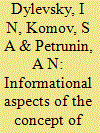

|
|
|
|
|
| Publication |
2013.
|
| Summary/Abstract |
The paper offers a retrospective analysis of the way the content of the aggression concept in international law has been formed, while taking into account the current practice of using information and communication technologies to affect foreign information resources across the border.
It follows from the analysis that the existing definition of aggression could still be used with some adjustment and further specification concerning prospective acts of aggression in information space.
|
|
|
|
|
|
|
|
|
|
|
|
|
|
|
|
| 5 |
ID:
166003
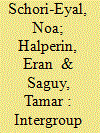

|
|
|
|
|
| Summary/Abstract |
Despite their pernicious effect on intergroup conflict, collateral casualties are seen as inevitable and justified by many members of the groups involved, particularly those who endorse a right-wing ideology. Drawing on social psychological literature, we examined whether a perception of commonality between in-group and out-group can be beneficial for reducing tolerance to collateral causalities. We hypothesized that viewing the out-group as sharing commonalities with the in-group can reduce processes of out-group delegitimization, which are common among right-wingers in intractable conflicts, and may therefore serve to explain reduction in tolerance to collateral casualties. Three correlational studies were conducted among Jewish-Israelis in the context of the conflict with the Palestinians to test this. In Study 1, right-wing political ideology was associated with stronger support for enemy collateral casualties, and the effect was moderated by perceived intergroup commonality. While leftists were overall non-supportive of collateral casualties, rightists who perceived high intergroup commonality were less tolerant of collateral casualties than those low on intergroup commonality. In Study 2, conducted during violent escalation, we replicated these results while controlling for anger, fear, and hatred. In Study 3, we found that the effect was mediated by delegitimization of the out-group. These results extend the range of beneficial impact of intergroup commonality, and imply that it may be used as a tool to promote conflict resolution.
|
|
|
|
|
|
|
|
|
|
|
|
|
|
|
|
| 6 |
ID:
001833


|
|
|
|
|
| Publication |
Washington DC, Woodrow Wilson Center Press, 1994.
|
| Description |
xx,290p.
|
| Standard Number |
0943875978
|
|
|
|
|
|
|
|
|
|
|
|
Copies: C:1/I:0,R:0,Q:0
Circulation
| Accession# | Call# | Current Location | Status | Policy | Location |
| 042981 | 327.73/LIT 042981 | Main | On Shelf | General | |
|
|
|
|
| 7 |
ID:
092125
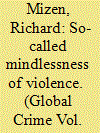

|
|
|
|
|
| Publication |
2009.
|
| Summary/Abstract |
This article proposes that violence may be most usefully thought about as a psychological rather than a behavioural phenomenon. Violence, it is contended, is a pathological variant of aggression, where 'aggression' is used to describe a particular part of the range of affective endowments possessed by human beings. We might think about aggression as a 'set' of which violence is a subset. As an affective endowment, aggression requires integration during development and this is supplied initially by an infant's primary carers and later by other important objects and institutions in the environment and culture in which the growing child lives. In the absence of the required conditions for enabling psychological integration to take place, rather than integration, disintegration holds sway with the aggressive affects denied or dissociated from. In this instance the affects do not become part of the affective repertoire upon which the individual can draw in order to orientate him or herself to their environment and in particular objects in the environment. Instead the affect is experienced as exterior and other and in some circumstances as violating. In this circumstances violence is resorted to as a way of escaping from the experience of overwhelming affects, for example by evoking in another affective experiences that cannot be tolerated within the self. Clinical case material is used to illustrate this.
|
|
|
|
|
|
|
|
|
|
|
|
|
|
|
|
| 8 |
ID:
181335


|
|
|
|
|
| Summary/Abstract |
This paper analyses allegations of aggression and criminality levelled against ambulant tourism entrepreneurs, such as tour guides and photographers, who work around the Taj Mahal in Agra, India, to understand how they experience neo-liberalisation in their everyday economic lives. I argue that these allegations function as technologies of neo-liberal governance through which non-state actors, like the media and tourists, engage in monitoring and regulating local entrepreneurs. Consequently, entrepreneurs experience neo-liberalisation in India in a paradoxical form: at once as a withdrawal of the Indian state from spaces it previously occupied and the simultaneous extension of governmentality, visible through increased public scrutiny.
|
|
|
|
|
|
|
|
|
|
|
|
|
|
|
|
| 9 |
ID:
190525


|
|
|
|
|
| Summary/Abstract |
This paper highlights both general and specific features of wars and armed conflicts and their key distinctions. It also formulates an extended approach to understanding latent features in the essence and content of the modern categories of war and armed conflict.
|
|
|
|
|
|
|
|
|
|
|
|
|
|
|
|
| 10 |
ID:
005071


|
|
|
|
|
| Publication |
Cambridge, Cambridge University Press, 1994.
|
| Description |
x,450p.
|
| Standard Number |
0521465255
|
|
|
|
|
|
|
|
|
|
|
|
Copies: C:1/I:0,R:0,Q:0
Circulation
| Accession# | Call# | Current Location | Status | Policy | Location |
| 036248 | 355.02/DIN 036248 | Main | On Shelf | General | |
|
|
|
|
|
|
|
|
|